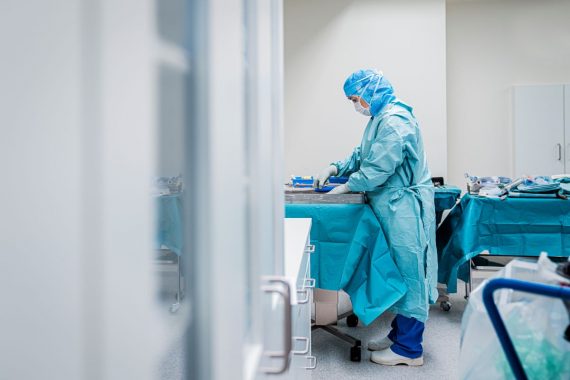Over 25k operations cancelled at least twice ‘place burden’ on GP workload

More than 25,000 hospital operations were cancelled at least twice last year, new research by the Liberal Democrats has shown.
Figures obtained by the Lib Dems through FOI requests, with data provided by 78 of the 124 hospital trusts in England, showed that 25,368 operations were cancelled twice or more in 2022, up 18% from the previous year.
GPs have told Pulse that these cancellations add to the workload in general practice, with patients turning to their GP for help being referred to a different hospital or managing symptoms while they wait.
The data showed that 112,000 operations have been cancelled twice or more since 2018 and that some patients have seen the same operation cancelled up to 13 times over the past five years.
RCGP chair Professor Kamila Hawthorne told Pulse that while patients are waiting for operations or specialist consultations, the responsibility for their care and management of their conditions ‘usually falls back on GP teams’.
She said: ‘We remain concerned about the number of patients being affected by long waiting lists for specialist treatment and cancellations or delays to operations.
‘Secondary care is facing unprecedented levels of pressure, and it is vital that government does everything it can to ensure that the impact of cancellations and waiting times on patients are minimized.’
She added that NHS pressures are not confined to secondary care and it is ‘crucial’ that any efforts to alleviate the backlog in hospitals also account for the increased pressures placed on general practice.
She added: ‘GPs estimate that on average, 27% of their workload relates to supporting patients on specialist waiting lists.
‘Whilst patients are waiting for operations or specialist consultations, the responsibility for their care and management of their conditions usually falls back on GP teams.
‘GPs have an important role to play in alleviating the pressures on other branches of the health service, but this can only be done when our workforce is appropriately resourced.
‘As long as we have such a substantial deficit of fully-qualified, full-time GPs, we won’t be able to support other branches of the health service or deal with the rise in the number of referrals, consultations and administrative duties which comes with recurring cancellations and longer waiting times in secondary care.
‘Delays to accessing secondary care treatment inevitably places a greater burden on already over-stretched GPs and this has wider ramifications for patient safety.
‘Every effort must be made to reduce the backlog, for the sake of our patients and the effective running of the NHS.’
Dr Selvaseelan Selvarajah, a GP in Tower Hamlets, told Pulse: ‘Hospitals are very much challenged with bed capacity and workforce issues which means elective operations can be cancelled at the last minute.
‘Clearly this is having an impact on patients and we are all very much sympathetic to their plight.
‘Many of these patients turn to GPs to help. I have had patients contacting me to expedite the postponed dates, refer them to a different NHS hospital or ask for a private referral.
‘Often they repeatedly consult with us to help manage their symptoms while they wait.
‘All of this is adding to the workload in general practice which is already struggling to meet patients’ needs despite doing 20% more activity than pre-pandemic.’
Liberal Democrat leader Ed Davey said: ‘At the heart of each of these harrowing statistics is someone waiting in pain for the treatment they need after having their operation cancelled yet again.
‘Rishi Sunak promised to bring NHS waiting lists down, instead people are being let down after years of wilful neglect of our local health services under the Conservatives.
‘It is a scandal that patients are being so catastrophically let down, with some seeing their operation cancelled ten times or more.
‘This is not only damaging people’s lives, it is damaging our economy as people are left in limbo unable to return to work.’
The party also commissioned research from the House of Commons Library which has shown that 6% of patients in rural areas waited 28 days or more for a GP appointment between April and June, which is a third higher than the 4.6% of patients in urban areas.
Last month, Prime Minister Rishi Sunak blamed striking doctors for long NHS waiting lists, saying that the industrial action is the reason patients have to wait for appointments.
Pulse July survey
Take our July 2025 survey to potentially win £1.000 worth of tokens

Related Articles
READERS' COMMENTS [3]
Please note, only GPs are permitted to add comments to articles











It is surely about time we increased appointment lengths in GP surgeries, to about an hour or two each patient.
Then we could just go ahead and do these operations instead of referring them to hospitals to be multiply cancelled.
After all, GPs are ideally placed to do most operations, having been trained as generalists, just like our forebears did in days of yore.
All we need is an assistant to administer a suitable anaesthetic under our supervision, and all these hordes of medical students being relocated frpm hospitals to General Practice for training, well, they would be ideally placed to do this after their 4 week anaesthetic attachment, I think, and would probably relish the intense training experiences GP can now be ideally placed to offer them.
Oh, did I really write that out loud?
Oops.
Ah well, never mind, it was a good idea anyway, while it lasted.
The HUGE secret waiting list (follow up and investigation) is not being counted. So multiple cancelled appointments seem not to matter to anyone (except the poor patient). 40% had waited over 1 year (medfer). Some reports asess 10,000 have had many cancellations, still waiting after 5 years.